Commission of inquiry misses deadline
A Commission of Inquiry that President Peter Mutharika instituted to investigate killings and abductions of persons with albinism (PWAs) has failed to meet the April 30 deadline for submission of findings.
The commission, chaired by retired Justice of the Supreme Court of Malawi Robert Chinangwa, has since asked the President, through Office of the President and Cabinet (OPC) Chief Secretary Lloyd Muhara, to consider extending the investigation period to June 30 this year to allow them to finalise investigations and produce a report.

The commission’s secretary Brenda Vokhiwa Kapenda said in an interview yesterday that they have sent formal communication to the President for consideration.
She estimated that 70 percent of the work has since been carried out, saying the commission has requested for an additional two months to do the remaining work.
Said Kapenda: “So far we have met different sectors such as the police, local citizenry, church leaders, politicians and civil society organisations, among others. Personally, I estimate the work done to be at 70 percent. But we still have more work to do because we are still doing inquiries.”
According to her, the commission intends to visit Tanzania and Mozambique, countries which also had similar incidences of killings and abductions, but the plan has not yet materialised because officials in those countries have not responded to the request for a meeting.
But Human Rights Defenders Coalition (HRDC) national vice-chairperson Gift Trapence expressed doubt if the inquiry will produce the desired results even if the President may consider extending the timeframe for investigations.
He said the delay means that PWAs may continue facing threats to their lives as there is no immediate solution provided in the absence of the report.
However, Trapence argued that the commission, which the CSO dismissed from the start, has failed to produce the report timely because its membership lacks people with expertise on a number of issues like criminal and forensic investigations.
He said: “Right from the onset, we questioned the composition of the commission. It does not have experts and because of that, the capacity to deliver is not sufficient.”
On the other hand, Trapence argued that the commission began performing its duties without being gazetted, causing some stakeholders to refuse to participate in its investigations.
Association of Persons with Albinism in Malawi (Apam) national coordinator Overstone Kondowe maintained his stand that his organisation would not participate in the process, as such he could not comment on something he described as ‘not credible.’
“We already said that we are not participating in the process undertaken by the commission. So we cannot comment on the process that we feel has no credibility,” he said.
Kondowe said in an earlier interview after President Mutharika had sworn in commissioners that the association would not take part in the process because government had not spelt out clearly terms of references for the probe.
Mutharika appointed the Commission of Inquiry two days before Apam protested against lack of commitment from government to protect people with albinism.
The protest also followed a series of killings and abductions despite the president’s pledge to protect all PWAs.
But CSOs including Apam wanted Mutharika to include some of its members in the commission, which the President did not do.
The 2016 Investigative Research on the Abductions, Killings and Exhumation of Remains of Persons with Albinism commissioned by Unicef is the only study that confirms the existence of body parts market, based on testimonies from participants of the inquiry.
This is a fourth inquiry since 2016, three others which have not produced results are the Malawi Human Rights Commission inquiry in 2017, Ministry of Gender and Social Welfare inquiry in 2016 with funding from Unicef and a UNDP funded probe in 2018 conducted by the Parliamentary Committee on Social Welfare.
The report identifies businesspersons, fishers, farmers and witchdoctors as perpetrators of the heinous crime.
It says the syndicate involves a chain of people, which include financier, middlemen and henchmen.





